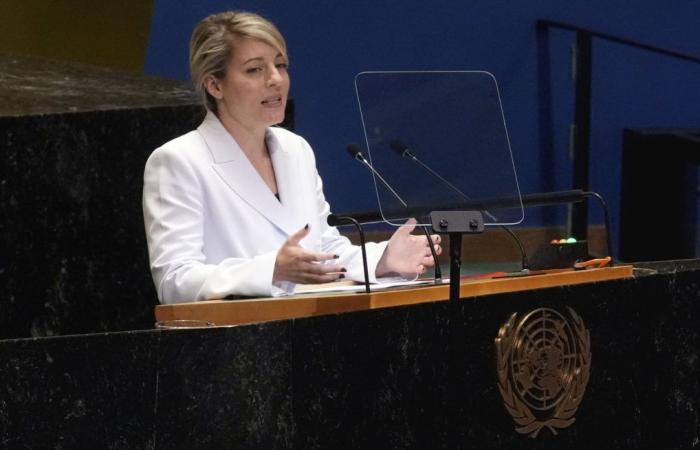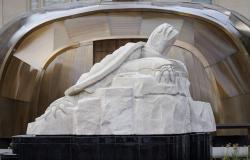Foreign Affairs Minister Mélanie Joly called on United Nations members to counter growing political polarization.
Ms. Joly addressed the UN General Assembly on behalf of Canada on Monday after the annual meeting of leaders and ministers in New York.
The Canadian minister said countries must work together to enforce the rules on sovereignty and human rights, otherwise the world will slide toward other crises like those in Haiti and Afghanistan.
Furthermore, she asserted that liberal democracies must reclaim the word “freedom”, which, according to her, is used to spread hate speech and justify Russia’s invasion of Ukraine.
Ms. Joly also reiterated Canada’s position on issues in the Middle East, criticizing in particular the Israeli government which opposes the possible creation of a Palestinian state.
She also said it is “unacceptable” that the UN has not been led by a woman in its almost eight decades of existence.
“The Lebanese people deserve to live in peace”
For his part, Prime Minister Justin Trudeau took advantage of a call on Sunday with the interim Prime Minister of Lebanon, Najib Mikati, to reiterate that “the Lebanese people deserve to live in peace” and call for a cease-fire. fire in the Middle East.
According to a summary of the conversation provided by the Prime Minister’s Office, Mr. Trudeau expressed concerns about the “devastating consequences” of recent events on civilians in Lebanon, where more than 1,000 people have been killed in the wake of a escalation of tensions between Israel and Hezbollah.
“The Lebanese people deserve to live in peace and security and must not have to bear the consequences of the actions of Hezbollah, a terrorist organization,” argued Mr. Trudeau during his call with Mr. Mikati, recalling that the The past few days have been trying for Canadians who have family in Lebanon.
Hostilities between Israel and Hezbollah increased almost two weeks ago, when walkie-talkies and pagers used by Hezbollah exploded across Lebanon. These explosions were the trigger for an intensification of airstrikes between the two camps.
In addition to the hundreds of deaths, tens of thousands of Lebanese had to flee the south of the country, at the request of the Israeli army. The exchanges of fire also forced evacuations in Israel.
According to the Lebanese Minister of Health, Israeli strikes have so far killed more than 1,030 people, including 156 women and 87 children, in less than two weeks.
Request for ceasefire
In response to the intensifying clashes, Canada and several of its allies called last week for a 21-day ceasefire. During his call with Lebanon’s interim prime minister, Mr. Trudeau repeated this request.
“Prime Minister Trudeau reaffirmed that Canada is committed to continuing its collaboration with the international community to advance peace in the region, as evidenced by his call for an immediate 21-day ceasefire on the border between Lebanon and Israel,” we can read in the summary of the discussion between the two leaders.
On Saturday, Canada announced it will provide $10 million in humanitarian aid to civilians in Lebanon. This funding will be added to the 10 million already allocated to the crisis in Lebanon by the United Nations Central Emergency Response Fund, to which Canada is a donor.
With The Canadian Press and information from the Associated Press
To watch on video
#Canada






